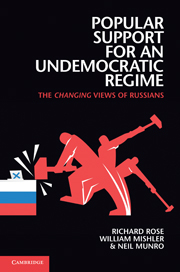Book contents
- Frontmatter
- Contents
- List of figures
- List of tables
- Introduction: The need for popular support
- 1 Democratic and undemocratic models of support
- 2 Changing the supply of regimes
- 3 Putin consolidates a new regime
- 4 Increasing support for an undemocratic regime
- 5 Individual influences on regime support
- 6 Time tells: there is no alternative
- 7 Finessing the challenge of succession
- 8 The challenge of economic reversal
- 9 Maintaining a regime – democratic or otherwise
- Appendix A New Russia Barometer samples
- Appendix B Coding of variables
- References
- Index
5 - Individual influences on regime support
Published online by Cambridge University Press: 05 June 2012
- Frontmatter
- Contents
- List of figures
- List of tables
- Introduction: The need for popular support
- 1 Democratic and undemocratic models of support
- 2 Changing the supply of regimes
- 3 Putin consolidates a new regime
- 4 Increasing support for an undemocratic regime
- 5 Individual influences on regime support
- 6 Time tells: there is no alternative
- 7 Finessing the challenge of succession
- 8 The challenge of economic reversal
- 9 Maintaining a regime – democratic or otherwise
- Appendix A New Russia Barometer samples
- Appendix B Coding of variables
- References
- Index
Summary
The unity of Russian society is a theme of tsarist and Soviet writers and is invoked by Vladimir Putin as well. However, every society is differentiated in many ways. The liberal idea that individuals choose the positions that divide them politically was explicitly rejected by Karl Marx. He argued in his Critique of Political Economy that “It is not the consciousness of men that determines their being but, on the contrary, their social being that determines their consciousness.” Although Soviet society claimed to be classless, many social differences could be found and the same is true of Russia today.
Given social differences, the critical question is: Which social distinctions influence regime support? Differences significant in one dimension of society – for example, tastes in sports or food – are unlikely to have a direct influence on political support. Combining multiple distinctions to create ideal-type categories – for example, young, well-educated, secular urbanites and old, uneducated rural churchgoers – reduces the size of each to a very small proportion of the total population. The majority of people tend to combine attributes with different political implications: for example, being uneducated but prosperous, or young rural residents. Such crosspressures require careful consideration when relating social differences to regime support.
- Type
- Chapter
- Information
- Popular Support for an Undemocratic RegimeThe Changing Views of Russians, pp. 84 - 103Publisher: Cambridge University PressPrint publication year: 2011

